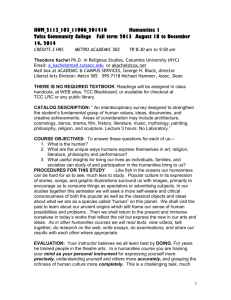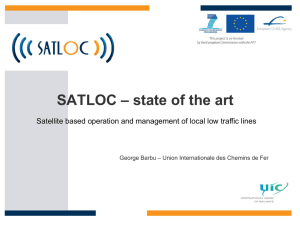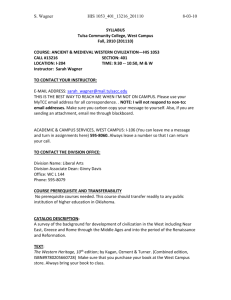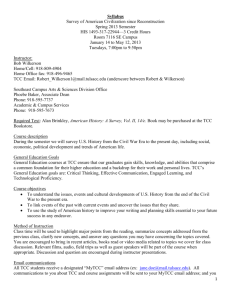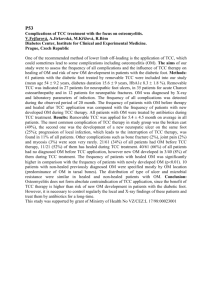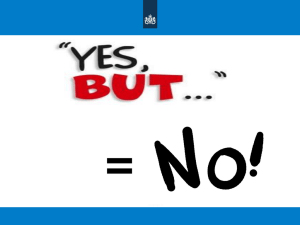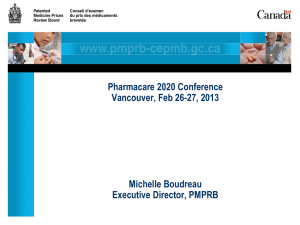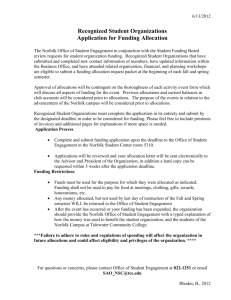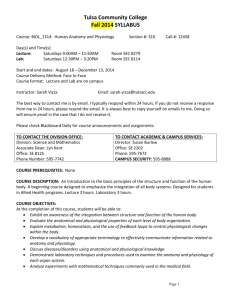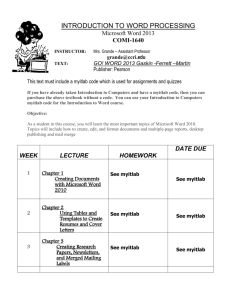CSCI_1203_393_30880_201330 (new
advertisement
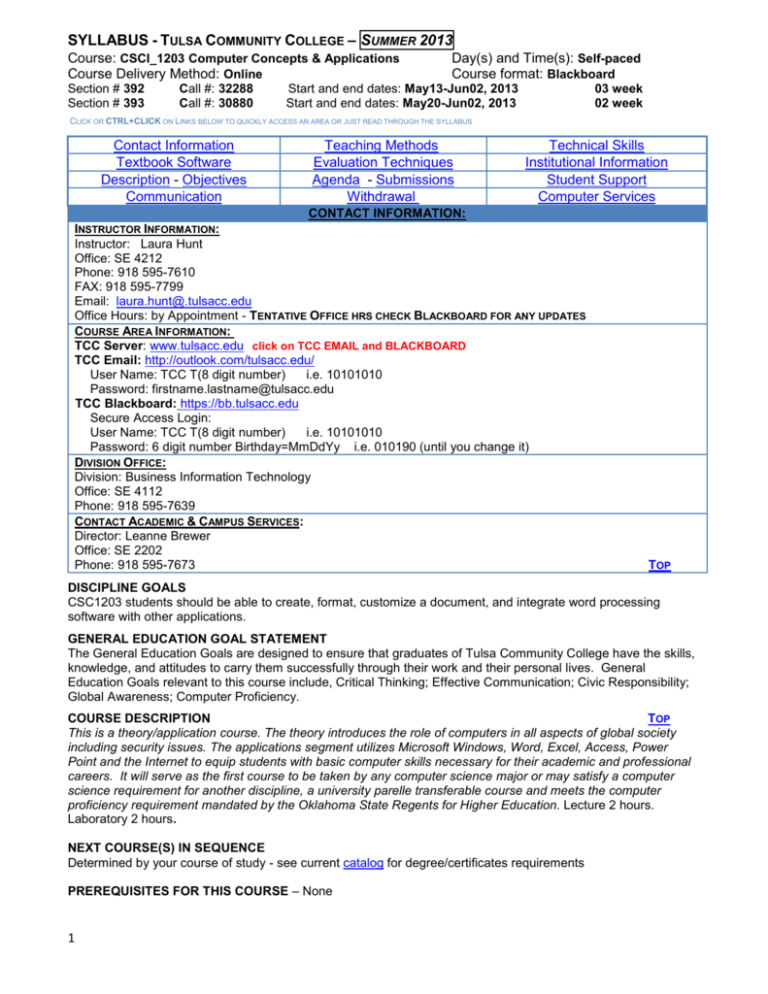
SYLLABUS - TULSA COMMUNITY COLLEGE – SUMMER 2013
Course: CSCI_1203 Computer Concepts & Applications
Course Delivery Method: Online
Section # 392
Section # 393
Call #: 32288
Call #: 30880
Day(s) and Time(s): Self-paced
Course format: Blackboard
Start and end dates: May13-Jun02, 2013
Start and end dates: May20-Jun02, 2013
03 week
02 week
CLICK OR CTRL+CLICK ON LINKS BELOW TO QUICKLY ACCESS AN AREA OR JUST READ THROUGH THE SYLLABUS
Contact Information
Textbook Software
Description - Objectives
Communication
Teaching Methods
Evaluation Techniques
Agenda - Submissions
Withdrawal
Technical Skills
Institutional Information
Student Support
Computer Services
CONTACT INFORMATION:
INSTRUCTOR INFORMATION:
Instructor: Laura Hunt
Office: SE 4212
Phone: 918 595-7610
FAX: 918 595-7799
Email: laura.hunt@.tulsacc.edu
Office Hours: by Appointment - TENTATIVE OFFICE HRS CHECK BLACKBOARD FOR ANY UPDATES
COURSE AREA INFORMATION:
TCC Server: www.tulsacc.edu click on TCC EMAIL and BLACKBOARD
TCC Email: http://outlook.com/tulsacc.edu/
User Name: TCC T(8 digit number)
i.e. 10101010
Password: firstname.lastname@tulsacc.edu
TCC Blackboard: https://bb.tulsacc.edu
Secure Access Login:
User Name: TCC T(8 digit number)
i.e. 10101010
Password: 6 digit number Birthday=MmDdYy i.e. 010190 (until you change it)
DIVISION OFFICE:
Division: Business Information Technology
Office: SE 4112
Phone: 918 595-7639
CONTACT ACADEMIC & CAMPUS SERVICES:
Director: Leanne Brewer
Office: SE 2202
Phone: 918 595-7673
TOP
DISCIPLINE GOALS
CSC1203 students should be able to create, format, customize a document, and integrate word processing
software with other applications.
GENERAL EDUCATION GOAL STATEMENT
The General Education Goals are designed to ensure that graduates of Tulsa Community College have the skills,
knowledge, and attitudes to carry them successfully through their work and their personal lives. General
Education Goals relevant to this course include, Critical Thinking; Effective Communication; Civic Responsibility;
Global Awareness; Computer Proficiency.
COURSE DESCRIPTION
TOP
This is a theory/application course. The theory introduces the role of computers in all aspects of global society
including security issues. The applications segment utilizes Microsoft Windows, Word, Excel, Access, Power
Point and the Internet to equip students with basic computer skills necessary for their academic and professional
careers. It will serve as the first course to be taken by any computer science major or may satisfy a computer
science requirement for another discipline, a university parelle transferable course and meets the computer
proficiency requirement mandated by the Oklahoma State Regents for Higher Education. Lecture 2 hours.
Laboratory 2 hours.
NEXT COURSE(S) IN SEQUENCE
Determined by your course of study - see current catalog for degree/certificates requirements
PREREQUISITES FOR THIS COURSE – None
1
COURSE OBJECTIVES
TOP
A. The theory introduces the role of computers in all aspects of global society including security issues.
B. The applications segment utilizes Microsoft Windows, Word, Excel, Access, Power Point and the Internet to
equip students with basic computer skills necessary for their academic and professional careers.
THEORY--
Describe how the computer processes and stores data, and how data moves through the system.
List steps taken to protect your privacy and security for your Computer System.
Know the importance of improving your computer systems reliability and security.
Describe relational database’s hierarchy and data maintenance tasks.
Identify and describe the function of computer components within the system unit including the CPU, memory,
expansion slots/cards, buses, and ports.
List some of networking advantages.
Describe various communications software, devices, and protocols.
Identify the functions and capabilities of mobile computing devices including media players, notebook computers,
PDAs and smart phones.
Identify basic internet terminology and concepts.
APPLICATION--
Describe the function of operating systems.
Identify the features and functions of the main categories of applications software.
List some of the common Office features.
Identify terminology, program and file management of a popular operating system (Windows).
Use a word processing package to create, modify and print documents.
Use an integrated electronic spreadsheet package to create, modify and print spreadsheets and charts.
Use a database to collect and manage records.
Use a presentation package to create and modify presentations.
TEXTBOOKS, SOFTWARE AND SUPPLEMENTAL MATERIAL
TOP
Required text: The following is in the new bundle number use number Bundled textbooks for these two textbooks
which should make these textbooks cheaper Or you may purchase the textbooks separately; Pearson Publisher;
www.pearsonhighered.com
Required Software and Materials:
•
Software: MSOffice- If you do not have Office, please check the Distance Learning web site for information on
downloading a free MSOffice2010 Business Suite. Directions for download are posted under the Student
Resources tab of Blackboard. You may also get Office 2010 on disk for a nominal charge.
•
Software: Antivirus is strongly recommended if you are using your HOME computer. You should purchase and
install a commercial antivirus software package or download and install free antivirus software. There are
several choices for free antivirus software at http://www.komando.com/downloads/ ... Also, the free AVG
Antivirus is used by many: http://www.grisoft.com/ww.home-and-office-security-comparison
•
Software Copyright: It is a violation of the law to create unauthorized duplicates of copyrighted microcomputer
software. Tulsa Community College makes every effort to support these copyright agreements and does not
support illegal duplication of any copyrighted material.
•
Computer Media and Headphones/Earphones:
o You should have some means of backing up your work. USB flash drives work best. It is a good policy to
always keep a backup copy of every assignment you complete in any class!!!
o
2
Set of headphones or earphones for use when you are not alone using the MyItLab time (On-campus)!
COURSES TEXTBOOK INFORMATION:
Information from the publisher so if you do not want the printed textbooks, note that you can purchase
this code directly online at www.myitlab.com. GO! myitlab for Office 2010 Student Access Code Card
with eText, 1/e 013510730X All of your GRADED Coursework is done via myitlab site.
YOU WILL NEED A STUDENT CODE FOR “MYITLAB FOR GO! WITH MICROSOFT OFFICE 2010”
o FOUND ON A CARDSTOCK BETWEEN YOU 2 NEW TEXTBOOKS, OR
o PURCHASED IN THE BOOKSTORE, OR
o PURCHASED FROM THE PEARSON SITE @ WWW.MYITLAB.COM
YOU MAY NOT WANT TO PURCHASE A PRINTED COPY OF THE TEXTBOOK SINCE WWW.MYITLAB.COM WILL HAVE
AN E-TEXTOOK, PRESENTATIONS AND VIDEOS WITH THE ONLY THE CODE BUT YOU MUST HAVE A STUDENT CODE
TO DO YOUR COURSEWORK IN THIS CLASS.
COURSE TEXTBOOK BUNDLE CODE: ISBN-10: 1256124672 ISBN-13: 9781256124672 Publisher: Pearson Custom
PublishingCopyright: 2012 Format: Multimedia PkgThis bundle contains: myitlab code, textbooks (TIA Complete 8/e & GO!
Microsoft Office2010 Vol1
myitlab with Pearson eText -- Access Card -- for Office 2010 | ISBN-10: 0132119560
Technology in Action Complete | ISBN-10: 1256278076
GO! with Microsoft Office 2010 Volume I | ISBN-10: 125627867X
CLASS APPLICATION GRADED ON LABS (ACTIVITIES A & B PLUS GRADED PROJECTS): Myitlab code with eText:
ISBN-10: 0132119560
GO! With Microsoft Office 2010 Volume1; authors: Gaskin, Ferrett, Vargas, and McLellan; ISBN-10:
125627867X
MSOFFICE 2010 SUITE FREE AVAILABLE TO DOWNLOAD ON BB UNDER THE STUDENT RESOURCE TAB.
CLASS APPLICATION GRADED ON EXAMS: Technology in Action, Complete 8th Edition; authors: Alan
Evans, Kendall Martin, Mary Anne Poatsy; Pearson Publisher; Custom Edition for Tulsa Community College; ISBN10: 1256278076
Blackboard Web Site for class see Course Area Information for details on how to access
Helpful Resources: Online resources available on Blackboard course site – you may need to download and
install these free programs on your computer to be able to take full advantage of our supplemental resources.
PowerPoint viewer, Adobe Acrobat Reader, Shockwave, Quicktime and Java Script
TENTATIVE SCHEDULE OF ACTIVITIES / AGENDA
TEACHING METHODS
Course content will include hands-on lessons and presentations. Coursework will have applicable lab work,
quizzes. Agenda available on the www.myitlab.com Course Content, Start Here link and in Blackboard
Information, Grading Information, Agenda Checklist link.
SUBMITTING ASSIGNMENTS
TOP
All coursework is to be submitted through www.myitlab.com site. Specific guidelines and instructions are located
there. All assignments, grades and communications may be utilized via myitlab.com secure server.
Contact the instructor if you are unable to complete work for more than two consecutive weeks. Students who
stop participating in the course and fail to withdraw may receive a course grade of “F,” which may have financial
aid consequences for the student.
3
TECHNICAL SKILLS AND STUDENT EXPECTATIONS
Technically you should be comfortable:
Using a word processor: basic text editing, image insertion techniques
Understanding file management functions: saving, renaming, copying, folder organization, etc.
Using the Internet: navigating, searching, uploading/downloading, email
Student Expectations for course success:
Reading over course material, viewing available presentations before class
Staying current and NOT falling behind with your coursework
Logging onto Blackboard at least twice a week – access resource materials, submit coursework
Asking for help when you need help via in class or email
EVALUATION TECHNIQUES
TOP
---- GRADED COURSEWORK IS DONE THROUGH YOUR WWW.MYITLAB.COM CLASS.
50% = Windows/Office Assessments are comprised of 25 Skill-Based Trainings and/or Skill-Based Exams
50% = Technology In Action Exams are comprised of objective multiple choice questions over 9 chapters (3
tests plus two comprehensive Assessments).
GRADING --- Evaluation of coursework is based on the standard 10-point grading scale (90-100% = A, etc.) with
690 total points. All coursework must be submitted prior to midnight after the last class day. GRADES will be
submitted to the TCC server as soon as you complete this class or by midnight of the last class day; it is
encouraged that you work ahead.
COMMUNICATING WITH THE INSTRUCTOR
TCC students receive a designated “MyTCC” email address. All email communications to you will be sent to your
MyTCC email address. You must use MyTCC email to send email to, and receive email from, the instructor.
These communications are secure and automatically identify the course ID and section. You may forward your
TCC email account to another account for convenience, but it will forfeit the privacy feature.
Normal response time from the instructor is 24 hours after receiving a student’s email.
DISCUSSION AND EMAIL ETIQUETTE
Students are expected to display tolerance for others’ views in discussions and through emails. Comments and
language should be respectful and appropriate for a college community.
COURSE WITHDRAWAL
TOP
Never Attended: ‘WN' grade will be assigned if you do not make contact with your instructor within the first two
weeks of class. Within the first week of the class to prevent from being withdrawn from this class.
Administrative Withdrawal: ‘AW' grade may be assigned by your instructor if you do not make contact with your
instructor for two consecutive weeks during this class.
Withdrawal: ‘W' grade must be initiated by you. The deadline to withdraw from a course shall not exceed 3/4 the
duration of any class. 70% of the coursework needs to be completed by this time to prevent failing this
class or losing any Financial Aid. Check the TCC Academic Calendar for the deadline that applies to the
course(s). Begin the process with a discussion with the faculty member assigned to the course. Contact the
Advisement Office at any TCC campus to initiate withdrawal from a course ('W' grade) or to change from Credit to
Audit. Withdrawal and/or change to an audit from a course after the drop/add period can alter the financial aid
award for the current and future semesters. Students may receive an outstanding bill from TCC if the recalculation
leaves a balance due to TCC. Students who stop participating in the course and fail to withdraw may receive a
course grade of “F,” which may have financial aid consequences for the student
CLASSROOM DISRUPTION POLICY
Not being respectful of others will not be tolerated.
INSTITUTIONAL STATEMENT
TOP
Each student is responsible for being aware of the information contained in the TCC Catalog, TCC Student
Handbook, Student Code of Conduct Policy Handbook, and semester information listed in the class schedule. All
information may be viewed on the TCC website: www.tulsacc.edu
4
INCLEMENT WEATHER
TCC rarely closes. If extreme weather conditions or emergency situations arise, TCC always gives cancellation
notices to radio and television stations. This information is also posted on the TCC website (www.tulsacc.edu ).
TRANSFERABILITY
Please visit with the TCC Counseling Center or the Counseling Center at the college or university to which you
plan to transfer to determine transferability status of this course.
PLAGIARISM POLICY
Plagiarism is claiming, indicating, or implying that the ideas, sentences, or words of another writer are your own; it
includes having another writer do work claimed to be your own, copying the work of another and presenting it as
your own, or following the work of another as a guide to ideas and expressions that are then presented as your
own. The student should review the relevant sections of the TCC Student Code of Conduct Policy Handbook.
Plagiarism will not be tolerated and may result in dismissal from the course.
ADA POLICY – Students with Disabilities:
STUDENTS WITH SPECIAL NEEDS: Students with documented disabilities are provided academic
accommodations through the disabled Student Resource Center (918-595-7115) or Resource Center for the Deaf
and Hard of Hearing (918-595-7428V, 918-595-7434TTY). If any student is in need of academic
accommodations from either office, it is the student’s responsibility to advise the instructor so an appropriated
referral can be made no later than the first week of class. Students may also contact the disabled Student
Services Offices directly at the telephone numbers indicated. ACADEMIC ACCOMMODATIONS WILL NOT BE
PROVIDED UNLESS APPROPRIATE DOCUMENTATION IS PROVIDED TO THE DISABLED STUDENT
SERVICES OFFICES TO SUPPORT THE NEED.
ACADEMIC DISHONESTY OR MISCONDUCT
Academic dishonesty or misconduct is not condoned or tolerated at campuses within the Tulsa Community
College system. Academic dishonesty is behavior in which a deliberately fraudulent misrepresentation is
employed in an attempt to gain underserved intellectual credit, either for oneself or for another. Academic
misconduct is behavior that results in intellectual advantage obtained by violating specific standards, but without
deliberate intent or use of fraudulent means. The student should review the relevant sections of the TCC Student
Code of Conduct Policy Handbook.
COMPUTER SERVICES ACCEPTABLE USE
TOP
Access to computing resources is a privilege granted to all TCC faculty, staff, and students.
Use of TCC computing resources is limited to purposes related to the College’s mission of education, research,
and community service. Student use of technology is governed by the Computer Services Acceptable Use
Statements/Standards found in the TCC Student Policies and Resource Handbook. .
LEARNING SUPPORT SERVICES
The following services are available at the designated locations on the TCC college campuses
to assist the student in this course:
Metro Campus
Distance Learning, MC129 (595-7143)
Microcomputer Lab, MP200 (595-7146)
Communications/Reading Lab, MC536 (595-7214)
Writing Lab, MC 306 (595-7240)
Learning Resources Center, MC200 (595-7172)
Northeast Campus
Microcomputer Lab, NE A1 (595-7592)
Learning Resources Center, NE1135 (595-7501)
5
TOP
Southeast Campus
Microcomputer Lab, SE4231 (595-7643)
Communications Center, SE1102 (595-7749)
Learning Resources Center, SE7200 (595-7701)
West Campus
Microcomputer Lab, WCI166 (595-8122)
Reading & Writing Center, WCI116 (595-8063)
Learning Resources Center, WCI266 (595-8010)
